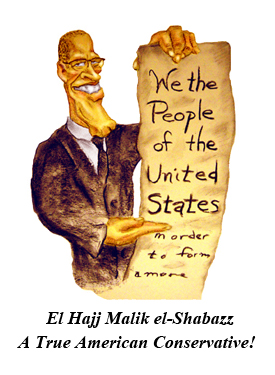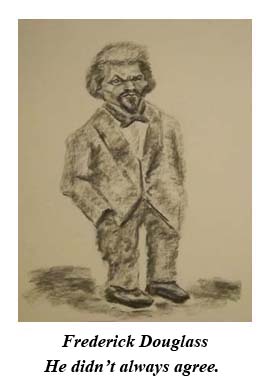|
|
|
Return to Malcolm X Caricature |

By the early 1960's nearly a century had passed since the end of the Civil War, but it was still perfectly legal to keep people out of restaurants, museums, public parks, schools, universities, theaters, and the voting booth simply based on their skin pigmentation. And this was also the time when college educated black Americans found themselves driving cabs or working on lower scale construction jobs. The top of the class were lucky if they could get postal, teaching, or preaching jobs. Civil rights workers were growing in numbers but they still risked being jailed, beaten, and even murdered. Some were.
Malcolm and his friends had long felt enough was enough. Their goal was to develop a completely separate black community which operated independently of the white economic system. Only then, they felt, could they keep the products of organized crime - drug addiction, alcoholism, prostitution - out of their neighborhoods.
That was not, let us hasten to say, what the majority of Americans wanted to hear. After all, civil rights workers had been striving to achieve full integration of the races, not separation. This had been the official goal of the majority of African American leadership since the early nineteenth century - Frederick Douglass had once met personally with Abraham Lincoln to derail the tentative plan to return freed slaves to Liberia. But now Malcolm was trying to - and was having disturbing success - in creating his separatist community. As the fifties merged into the sixties, Malcolm found himself reviled - universally in the white community - but also by a large part of the black community as well.
Worse to many was Malcolm's religion. At the time, the African community in America was strongly Protestant and much of the social life was centered around the church. Ministers were among the most influential members of the black community and many of the civil rights leaders - Martin Luther King, Ralph Abernathy - were pastors of churches. The tendency to couple civil rights with traditional Christianity with its philosophy of turn-the-other-cheek and serve your masters (both quotes from the Bible) gave many whites a comforting warm and fuzzy feeling.
But in the late 1940's Malcolm had converted to Islam and originally belonged to the Nation of Islam led by Elijah Muhammad. Elijah preached that the black races - which the Nation did not simply define as those of African descent but also included most Asian races - were superior by nature to the whites. Whites, the doctrine preached were "devils". Some might be well meaning, but they could not really be good - that was simply contrary to their nature.
Elijah and the Nation of Islam produced real anxiety and angst in America and in 1959, Mike Wallace - now famous as the host and reporter of 60 Minutes - produced a television documentary that was the first image that Mr. and Mrs. Every Person had of the black Muslim's. The title The Hate that Hate Produced was something that Malcolm took exception to. He said he didn't hate anyone, he said, nor did he believe in violence. Everyone in the Nation of Islam, he said, was to obey the laws. Still he and the others - like all Americans - had the right to defend themselves and this included using their right to bear arms and organize well ordered militia.
The Nation of Islam was not only controversial in America, but in the world as well. It was not accepted by orthodox Islamic governments and so when Malcolm decided to make the hajj - the visit to Mecca required by Islam's Five Pillars - he found himself detained until he was able to convince the Saudi authorities of his sincerity.

Malcom's trip to Mecca produced a fundamental shift in his philosophy. Surrounded by hundred of thousands of Muslims of all races tied by a common set of beliefs, when he returned Malcolm announced he no longer accepted the doctrine that any race was superior to another. This led to a complete and not amiable spit from the Nation of Islam - and as is widely believed - Malcolm's assassination while speaking in the Audubon Ballroom in Manhattan on February 25, 1965.
Without doubt Malcolm was the most articulate spokesman of the 1960's civil rights era. In personal interviews he was always patient and courteous - 180 degree opposite the current belligerent interviewees (and interviewORs) we have today. Despite the claim that his speeches were fiery and demagogic, actually they were straight to the point and virtually all were delivered in a calm, almost conversational style. He addressed the issues with clarity and avoided extravagant rhetorical devices or flourishes that makes most politicians sound so corny.
As far as the content of his speeches (which even white "liberals" found so alarming), it's also forgotten how dangerous the times were. In 1963, a sitting (and white) governor had stated publicly the way to stop integration was to have - and this is a quote - "a few first class funerals". A week later a bomb exploded in a church in the state's largest city, killing four black girls, ages 11 to 14. So compared to the rhetoric from some elected white officials, Malcolm's speeches were surprisingly moderate in tone and were not the incitement to violence and revolution that they were taken for.
Like Socrates or Christ, Malcolm himself wrote virtually nothing down himself. Instead his speeches and words were collected and published by others. You can, of course, pick and choose what he said to prove he believed this-or-that or that-or-this and you can prove he was either a rabid separatist and racist or a proponent of full multi-cultural society. But if you take into account when Malcolm made certain statements you find he was much more consistent and Malcolm, unlike many politicians, readily admitted he changed his mind.
Malcolm was a man decades ahead of his times. He was saying no to drugs back while middle class white kids believed all the stuff Timothy Leary said about tuning in and turning on and business executives were taking a few minutes at lunch to snort down some coke. Malcolm had no smoking rules in house and home (and automobiles as author Alex Haley learned) decades before the state and local governments finally made them the law.
Of course, we've come a long way since Malcolm's time. Segregation has long been illegal, all Americans can vote (if they want), and many southern (and northern) states and cities have black political leaders. And above all we and our politicians now understand the importance of addressing the issues and avoid incitement by inflammatory and dangerous political rhetoric.
Don't we?
References
Malcolm X: A Life of Reinvention, Manning Marable, Viking Adult (2011). This was the last published work Professor Manning, who was the director of the Malcolm X Project at Columbia University. But caveat emptor! - this a very good book and is by no means a idolizing apotheosis. It is an objective and detailed account of Malcolm's life where Professor Manning discusses not only Malcolm the public figure, but the private individual as well and includes much detail about Malcolm's problems - both personal and political.
Professor Manning died just two months after the book, which took decades to research and write, was published.
The Autobiography of Malcolm X, Malcolm X and Alex Haley, Grove Press (1966). The primary source of information about Malcolm's life. There is, sadly, no full fledged biography of Malcolm although several have been in the works for a number of years.
The Malcolm X Project at Columbia University,Manning Marable, Director, http://www.columbia.edu/cu/ccbh/mxp/ This webpage gives some ifnormation about Malcolm and his life but not in great detail. There are, though, a texts of Malcolm's speeches. Professor Marable, the project director, is writing a book about Malcolm which is supposed to be published in 2011.
Malcolm X, starring Denzel Washinton, Directed and Produced by Shelton "Spike" Lee (Warner Brothers, 1992). CooperToons normally refrains from citing motions pictures because there is a tendency for scriptwriters to make up scenes out of the whole cloth. Not so here. In Malcolm X Spike Lee followed closely what was then the best account of Malcolm's life, the Autobiography, but also clearly delved deeply into primary source material. The complex series of events in Malcolm's life (including the chaotic frenzy during his assassination) is followed about as exactly as possible in a cinematic representation. The motion picture did fairly well at the box office and was (virtually and justly) universally praised by the critics.